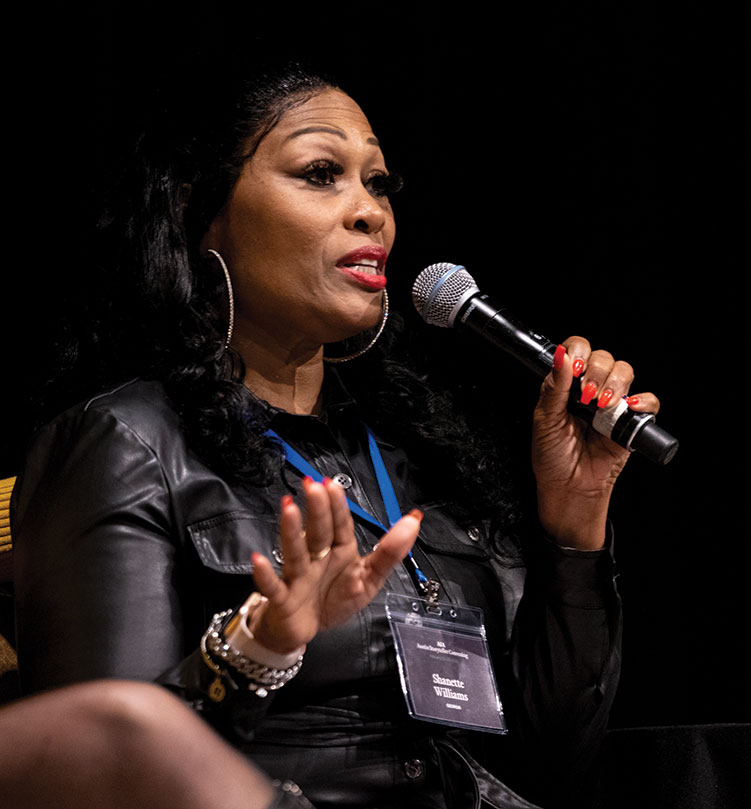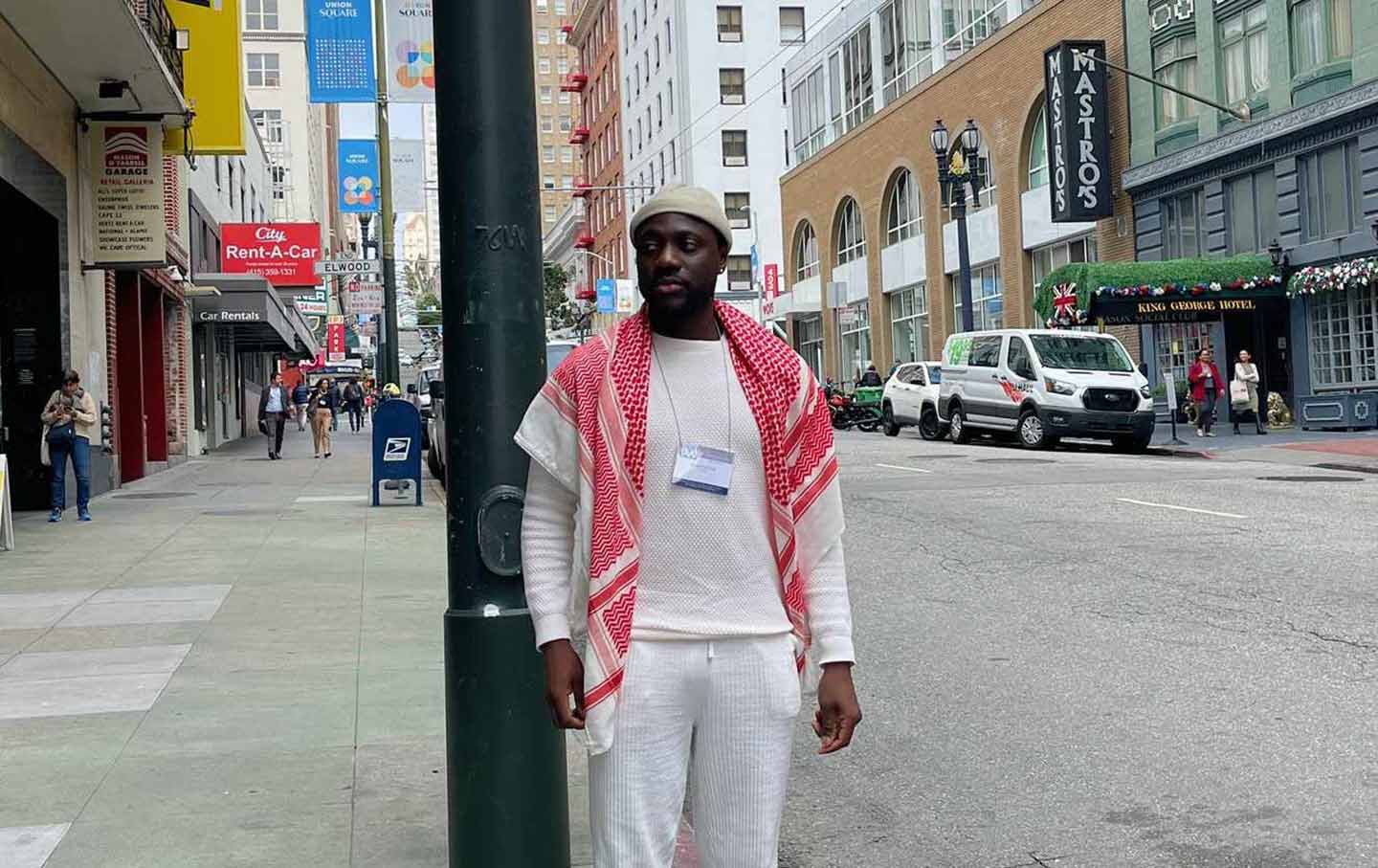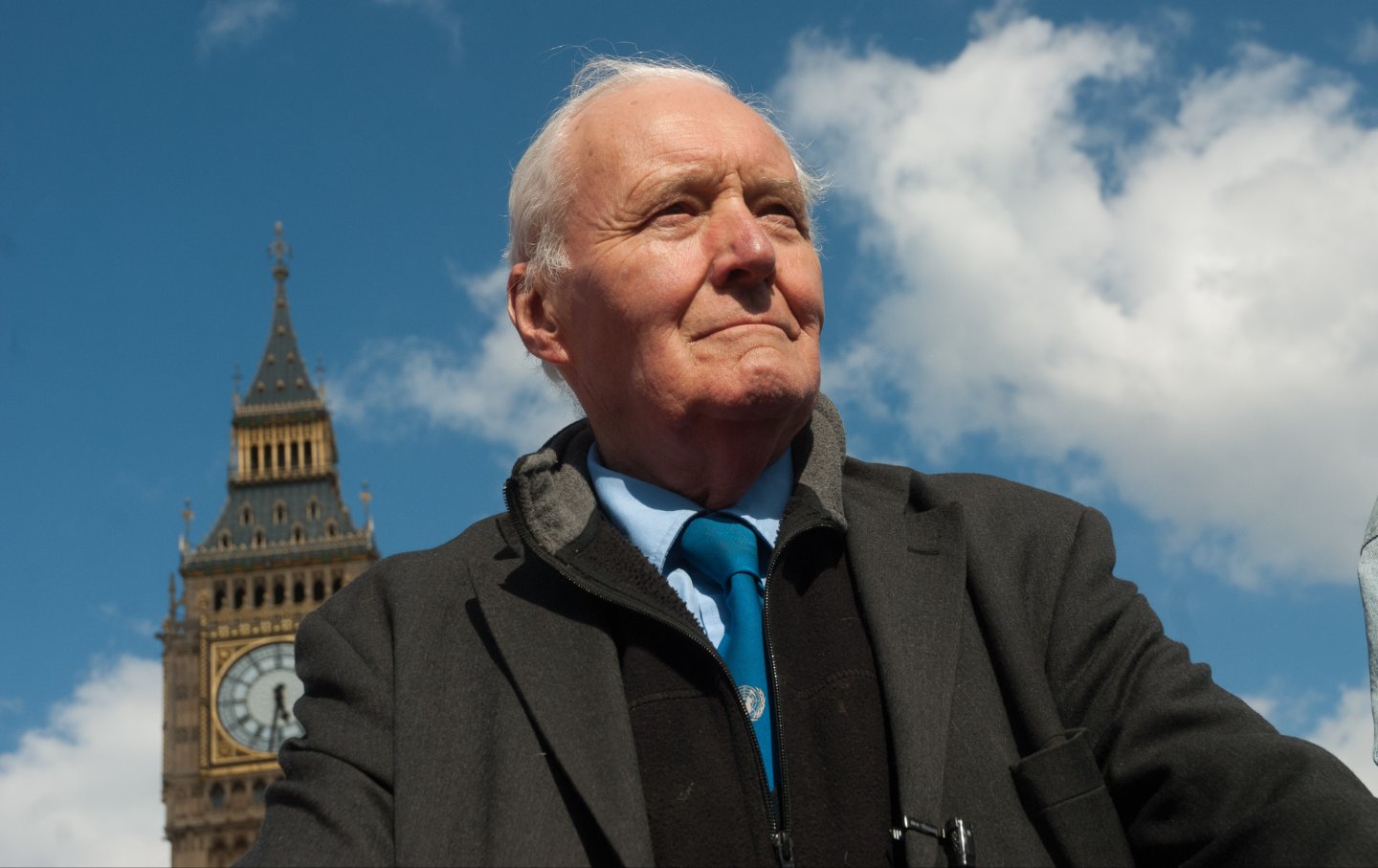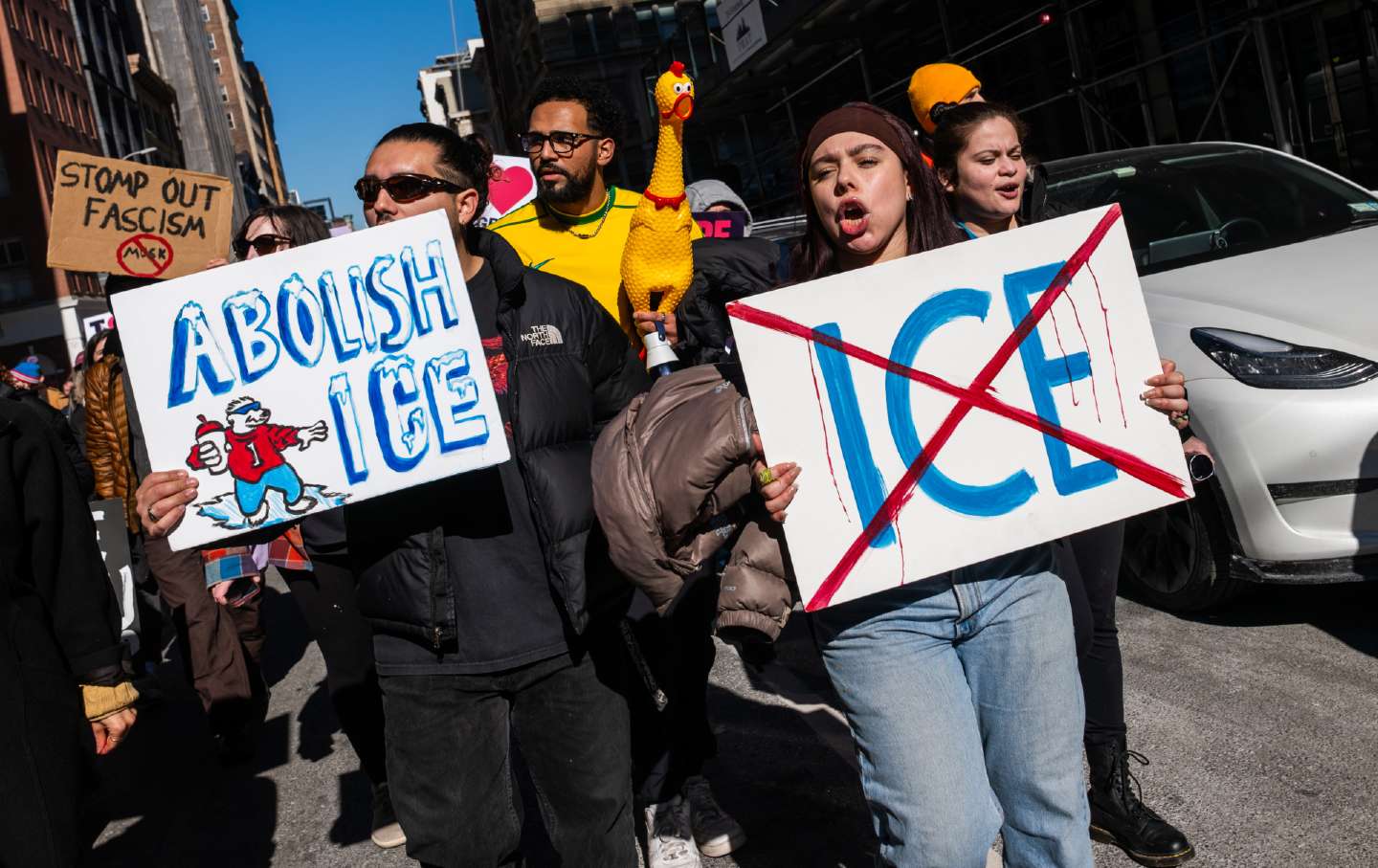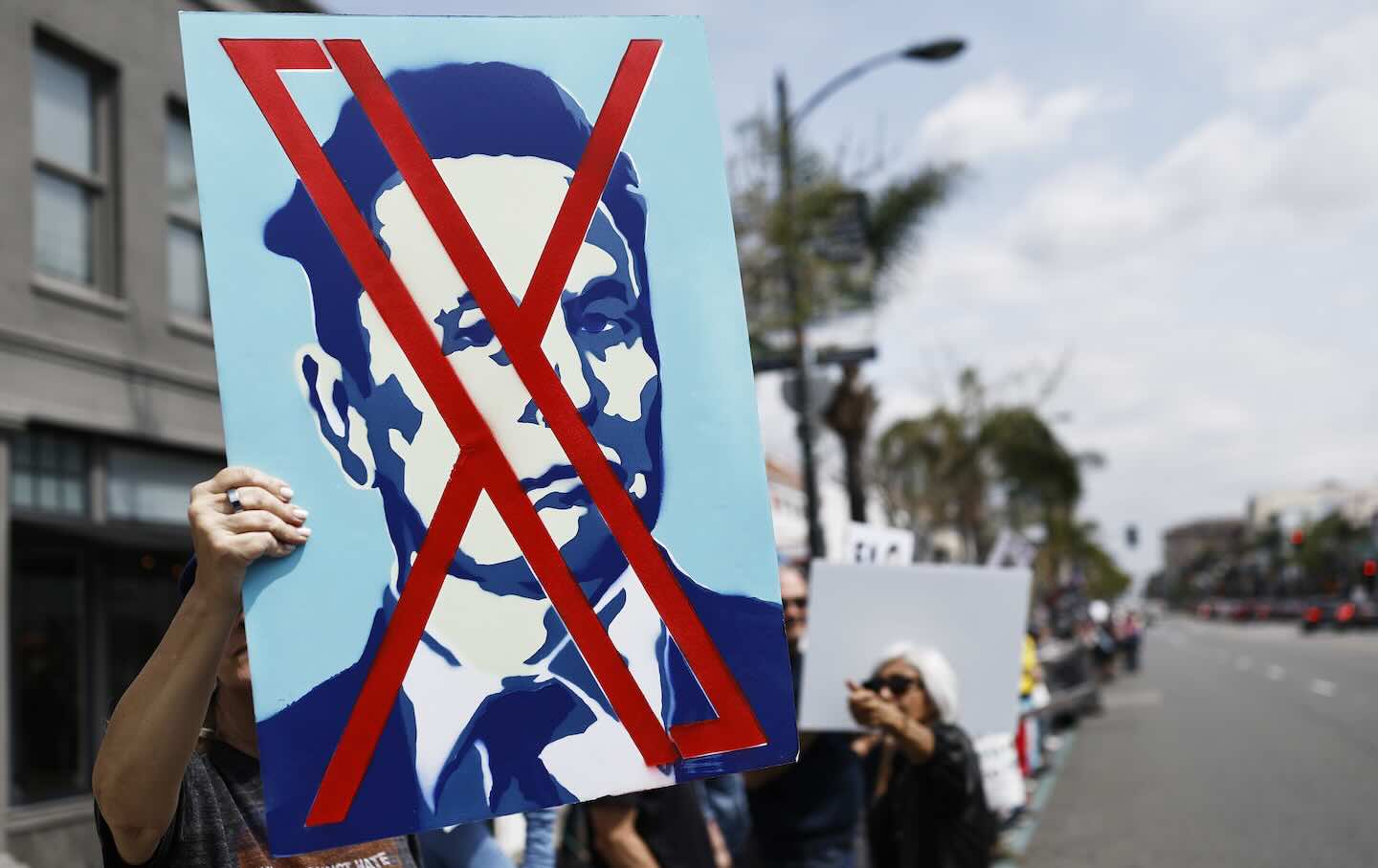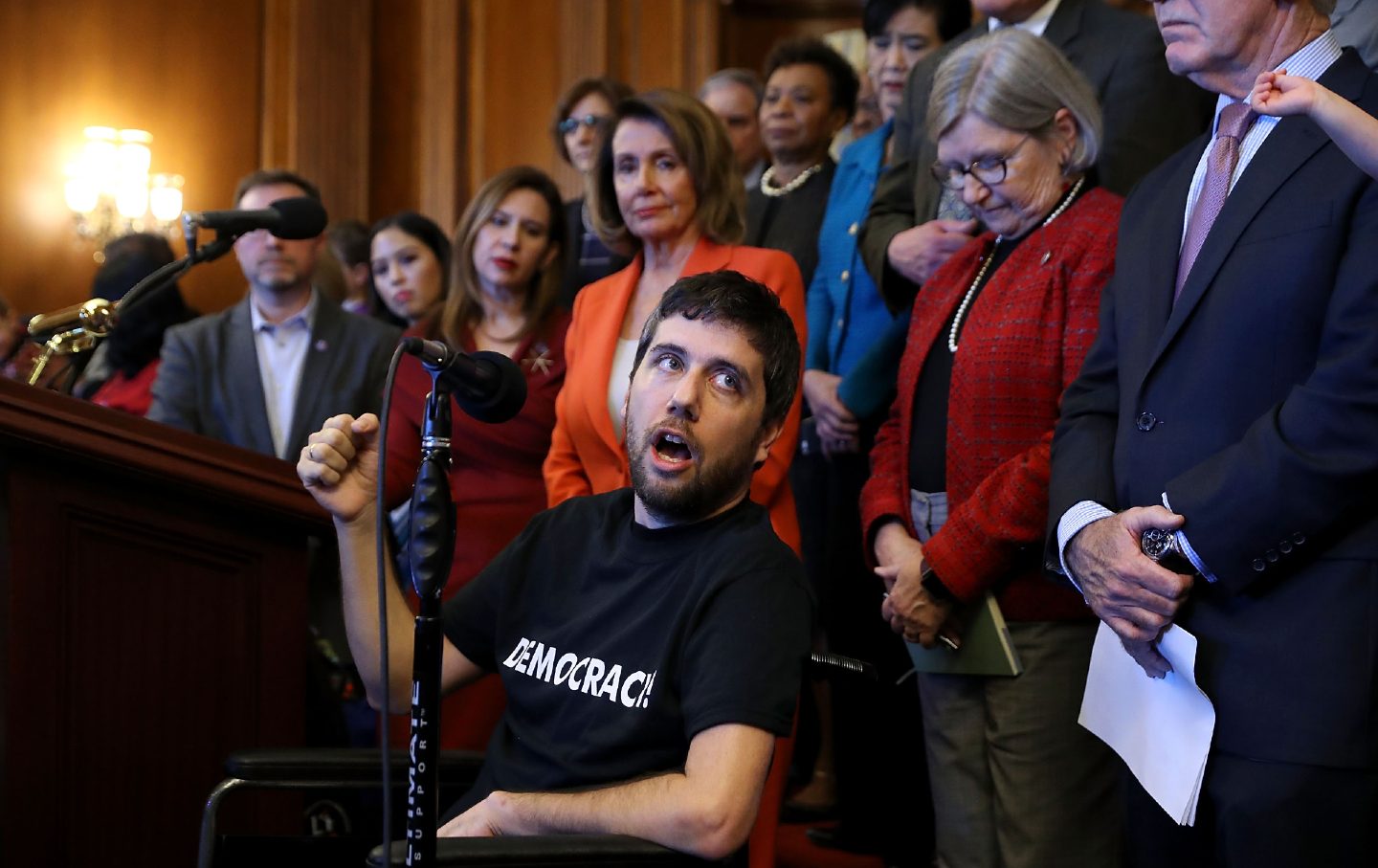
Ady Barkan (C) delivers remarks during a rally organized by House minority leader Nancy Pelosi (D-Calif.) at the US Capitol,December 19, 2017.
(Chip Somodevilla / Getty Images)We had the blessing to know Ady Barkan before his diagnosis with his ALS, back when he was “an energetic, but relatively anonymous footsoldier for progressive causes,” as the New York Times wrote in his obituary. So we had the chance to see early what others would only see later, once he confronted death so courageously that everyone took notice.
We met him on a long-shot political campaign for an insurgent State Assembly candidate, when he was just out of Yale Law School. Organizing with Ady was a blessing, but not always an easy one. He had the brilliant knack—some might call it an obsession bordering on irritating everyone around him—of believing it was possible to win underdog campaigns by identifying all potential levers, debating until you had identified the best strategy, and relentlessly pursuing outlandishly bold ideas with dogged tenacity.
Later, this knack would move presidential candidates. But in 2011, in a dusty campaign office in Brooklyn, it meant a three-hour debate about whether what he believed to be an illegal school backpack giveaway by our opponent, which he had found in campaign finance filings, would make headlines and upend the campaign.
We lost that race. But thanks to Ady, we won lots of others.
Ady had a great dexterity with organizing tactics. He believed in grounding work for justice in the stories of people facing the problems themselves, but he didn’t think mass base-building would win on its own. He had technical genius, but he wasn’t a policy technocrat. He was media savvy, but not a comms guy. Through research to understand complex systems, through long debate and even longer memos, he was always focused on coming up with disciplined strategies—not only to advance concrete policy wins, but also to transform the playing field to change what’s winnable.
To overcome opposition to paid sick days for workers in New York City, he drafted a “petition to discharge” the bill, which meant pushing the bill onto the City Council floor without the speaker’s support. This was a risky and highly unusual move, nearly unprecedented in council history. His vision was not just a few sick days for the workers in one city but to empower workers to win more rights in all cities.
It was in this spirit that he worked with us to launch and build Local Progress, now a national network of nearly 1500 justice-minded local elected officials, who have helped win paid sick days, the Fight for $15, stronger tenant protections, public banking, municipally owned clean power, legal services for immigrants, and much more, all across the country.
When he told us he was going to launch a campaign to involve working people to demand a more responsive Federal Reserve Bank, we thought it sounded crazy. But in the years since then, the “Fed Up” campaign helped persuade the Fed’s governors to focus not just on price stability but also on creating good jobs. The impact—Ady’s impact—has been felt in the lives of millions of people.
After his diagnosis, he recognized that his own story, his failing voice, his dying body had become powerful tools for change that he could add to his organizing toolkit. As he lost the ability to move, his organizing dexterity only grew.
From his viral video cornering Senator Jeff Flake on an airplane and asking him to “be a hero” by protecting the Affordable Care Act, to civil disobedience arrests in his wheelchair, to his cross-country bus tour bird-dogging candidates, to commandeering the microphone of Pod Save America, to persuading the Democratic presidential candidates to do interviews with him, to his testimony at the first-ever Medicare for All hearing in Congress, to launching the Be A Hero campaign, Ady turned dying into organizing.
While he was never one to shy away from righteous conflict, he did not seek to hold people—those in power, or those he organized with—accountable through shame or to hold the moral high ground over us. Instead, with a glint of possibility in his eyes and a smile on his face, he invited us into the role we could play in fighting for a better and more just world.
In his last year, he launched a new—and typically Ady—campaign. He discovered that, far below the radar, the form of healthcare privatization known as “Medicare Advantage” was eroding America’s most trusted public health care system. Earlier this year, we passed the point where half of Medicare enrollees have been shifted to private, for-profit HMOs.
Ady rigorously assessed the obscure details, raised money, brought people together, and raised his—by now computerized—voice to call attention to this privatizing corporate trend. Once again, he was able to toggle between the ideal of Medicare for All and the strategic choice to fight against Medicare for fewer and fewer.
While the focus of his final years was healthcare, Ady did not narrow his vision to one issue. An Israeli citizen and a Jew, Ady was a fierce critic of Israel’s occupation of Palestinian territories. While he grieved the Hamas attacks of October 7, we know he’d be inspired by the creative tactics that IfNotNow and Jewish Voice for Peace are deploying to demand a cease-fire in Gaza.
Popular
“swipe left below to view more authors”Swipe →So much of what made Ady a tremendous activist also defined who he was as a father, a husband, and a friend. Where others might see an irresolvable paradox—whether to spend your remaining time focused on activism or with your family, how to make your life larger even as your time is getting shorter—Ady could see a way forward.
We were both flabbergasted and delighted when Ady told us, more than two years after his diagnosis, that Rachael was pregnant with their second child. Ady was devastated not to be the kind of husband and father he had imagined, but he poured love into Carl and Willow.
He wrote an amazing story to some of us last winter about playing a video of himself singing “This Land Is Your Land” (Willow called it “My Land Is Your Land”) that he had recorded before his illness, with Carl leaning on his arm, Willow holding his hand, and both kids singing along.
“And so there we were, singing in unison, my two children and me.
“When the song was over, Carl said ‘Willow, that’s Abba singing.’ Willow laughed, pointed at me, and said, ‘No, this is Abba!’ Carl explained that I sang the song when I could still walk, many years ago. Before he was born. Then I got to tell him that, actually, I recorded that song and the others in the set when he was a baby, so he would know what I sounded like, and know that I love him. I didn’t dare imagine, back in 2017, that I would someday get to listen to him sing along with me, let alone that his sister would make us a trio.
“I told them that I love them. Carl said he loved me. Willow gave me a big kiss. And they went to bed happy. I’m so grateful for them.
“It is a simple thing, a father reading stories and singing songs with his children. And of course, I wish that I could use my own silly voice to read the stories, and play the guitar as they sing. But, I have learned, and I relearn every day, that the antidote to being sad about everything I don’t have, is to be grateful for all that I do have.”
(And, of course, he pivoted from that to remind us that this was only possible because of his caregivers, and could we please contribute to Be A Hero for its campaign to push the Biden administration to expand Medicare’s home care program to cover many more people.)
Ady wrestled on a daily basis with the boundary between acceptance and hope. He accepted his ALS death sentence, but he was repelled by the kind of acceptance that substitutes complacency for work for change. He continued to live a life as large as possible and to take joy in an ever-expanding circle of community, friends, and family, even when so much of his ability to experience them fully had been taken away. So often, in ways large and small, he was the one to lift us up.
Back in 2018, with Donald Trump as president and Brett Kavanagh newly confirmed to the Supreme Court and times feeling dark, Ady took to the pages of The Nation to rewrite Reinhold Niebuhr’s Serenity Prayer. How could we pray for “the wisdom to know the difference” between the things we can change and the ones we can’t when we haven’t tested the boundaries?
His answer was that we’d find it only in organizing: “Collective courage must come first,” he wrote, “wisdom second, and serenity at the very end.”
His was not a naïve hopefulness. He experienced tremendous joy in the people he loved and the campaigns he fought—but also so many moments of shattering loss.
“Yet it is in these moments of defeat,” he wrote, “that hopeful, collective struggle retains its greatest power. I can transcend my dying body by hitching my future to yours. We can transcend the darkness of this moment by joining the struggles of past and future freedom fighters.”
“That is how, when we reach the end of our lives and look back on these heady moments, we will find peace in the knowledge that we did our best.”
You did transcend your dying body by hitching your future to all of ours, Ady. We’ll keep working to summon the collective courage—and the joy it can bring—that you taught us best of all.

